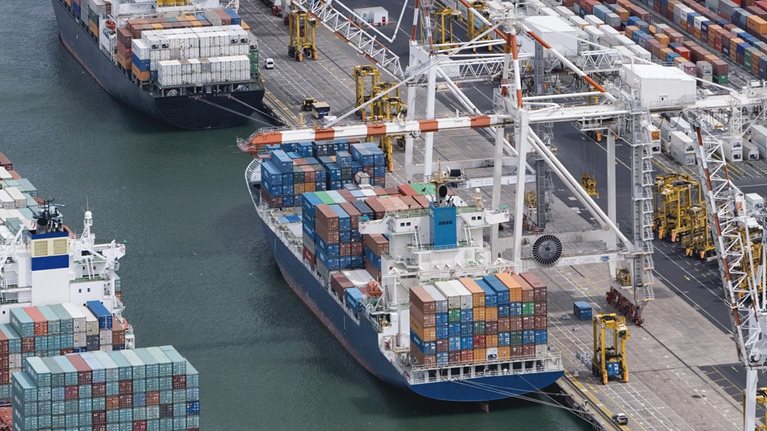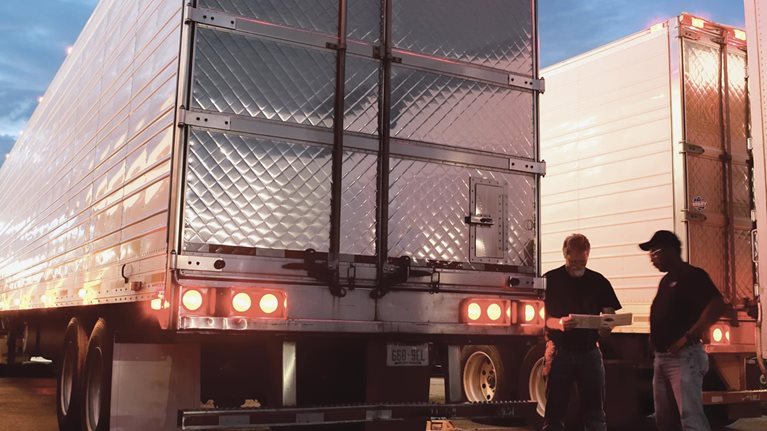In cross-border logistics, inefficiencies and bottlenecks are often the rule, not the exception. This is in large part due to the fragmented nature of supply chains. A shipment typically goes through more than a dozen different companies before arriving at its final destination, taking multiple transportation modes over land, air, and sea. A hiccup at any stage can trigger a cascade of delays.
Enter Nuvocargo, a digital platform facilitating cross-border trade flows between the United States and Mexico. Founded in 2019 by Deepak Chhugani, the company has assembled the separate players in the logistical chain between the two countries onto a single digital platform. The one-stop shop provides customers with end-to-end cross-border services including freight forwarding, customs brokerage, cargo insurance, and supply chain financing. In December 2021, the company raised $20.5 million in funding from investors including Tiger Global Management (which led the round), the Flexport Fund, QED Investors, and NFX.
In this conversation with McKinsey partner Will Enger, Chhugani discusses growing his digital start-up in the throes of a global pandemic, why the industry’s future lies in what he calls “structured data,” and what can be done to address the current supply chain crisis.
McKinsey: What’s changed for users of Nuvocargo?
Deepak Chhugani: Shippers and carriers are experts on developing their business, but finding the right logistics suppliers is becoming trickier. Nuvocargo allows shippers and carriers to focus on growing their business by offering a single platform that centralizes and simplifies cross-border logistics. For things like compliance, safety, and insurance, we connect shippers with all the relevant suppliers based on their needs and preferences. We’re confident of providing unmatched support from a bilingual team of experts before, during, and after cross-border movements.
Meanwhile, carriers come onto our platform not only in search of customers to fill their trucks. They also have other needs ranging from working-capital management to growing their business by financing fleets. They can also find that on Nuvocargo, which operates a multiproduct platform.
McKinsey: Conventional wisdom is that the pandemic has accelerated digitalization for most industries. What’s the pandemic’s impact on Nuvocargo?
Deepak Chhugani: First, the freight and logistics industry is still quite misunderstood by the technology and venture capital [VC] world. Most people in the start-up world don’t interact with this sector directly, even though the vast majority of the physical things that we encounter have gone through the supply chain. Investors and tech experts have to really dig into the nooks and crannies to understand the logistics sector. But when they do, they realize that the opportunities are massive precisely because the logistics industry is wildly inefficient compared to other industries.
In our case, we built most of our business during the pandemic, which has been more of an accelerant than anything else. We announced our seed in April 2020, just a few weeks after the COVID-19 pandemic started taking over the world. Because COVID-19 forced a lot of our customers in more traditional industries to adopt work-from-home practices and remote work, they’ve had to lean much more on technology in their day-to-day workflows. That’s been a tailwind in Nuvocargo’s favor, because what we offer our customers is technology, visibility, and efficiency all around. By 2021, the business had grown to close to a hundred employees.
McKinsey: How do you build your team?
Deepak Chhugani: Our company brings together the worlds of Silicon Valley and logistics. Our investors have built world-class Silicon Valley companies. A good chunk of our head count is engineers, product designers, product managers, the same kind of people who are building world-class technologies that you’ll find at Google, Facebook, and Airbnb.
And then we have people who come from the freight and logistics world who understand the intricacies of the business. Logistics is a real-world business that goes from offline to online, meaning that there are a lot of issues that you can’t solve with technology alone. At Nuvocargo, the best voices from the two worlds come together. This is important because that’s how we understand why and how the industry is moving toward digitization while being closely attuned to what’s actually going on in the real world.
McKinsey: What’s driving digitization in the logistics industry over the next decade?
Deepak Chhugani: I think we’re at the advent of structured data, which might sound like a very weird answer. The biggest issue now, when businesses are moving cargo from points A to B, is that they have to hire a bunch of different vendors and stakeholders. This requires a multitude of data touchpoints: Where’s my shipment? What’s going on? How much is it worth? How much did I pay?
All this information gets trapped in the fragmentation of all the different people you have to deal with to move a shipment. A platform like Nuvocargo is helping to structure a lot of this data to make it available and accessible to shippers. Creating standardized, structured data for the supply chain will empower the most impactful innovations in the industry. When truly structured data is widely available, many other innovations are enabled by leveraging tools such as APIs and integration technologies. This will allow for complete end-to-end visibility of your freight. You can innovate improvements in different pieces of the puzzle, things that happen at the border, and other areas in the supply chain.
Creating standardized, structured data for the supply chain will empower the most impactful innovations in the industry. When truly structured data is widely available, many other innovations are enabled by leveraging tools such as APIs and integration technologies.
Furthermore, increased attention from the venture capital and start-up sectors means incumbents that hitherto have been enjoying very large market shares and economies of scale are now pushed to be more competitive. In freight forwarding, the average customer satisfaction of incumbent players is negative or very low. As more start-ups enter the fray, legacy companies have to push the envelope further and build the technologies needed to improve the customer experience.
The combination of more start-ups, VC interest, and structured data is going to create an interesting level of competition. If I get into a time machine and make a prediction of where supply chains will be in five to ten years, I think you’ll have a mix of scaled incumbents that were able to digitize and adapt to some of these trends alongside start-ups that will dominate in regions that are more technological. These start-ups will do what the Googles and Facebooks of the world have done, which is to build dominant positions.
McKinsey: Why focus on the US–Mexico trade route?
Deepak Chhugani: If we look at what’s happening in the world from a macro standpoint, it’s become clear [to me] that the US–Mexico trade relationship is the most important inter-country trade relationship in the world.
Mexico is now the US’s number-one trading partner. And there’s many reasons to believe this is going to persist over time. There’s a very famous geopolitical strategist, Peter Zeihan. In his book, Disunited Nations, he predicts that this is going to be the most important trade relationship of our lifetimes.
There’s structural advantages to US–Mexico trade: same time zone, similar work cultures, proximity. We focus on over-the-road transportation. And that’s because the proximity allows you to move goods over the road at competitive prices. If you are a US shipper and you want to bring something over from China, bringing that over in an expedited fashion means paying for air freight. And air freight is pretty expensive. Otherwise you have to go via ocean, which takes 20, 30 days.

Logistics Disruptors
Mexico is just much closer. So you can get your goods over in just a matter of a few days. And then there’s also just government advantages. There’s a new USMCA [United States–Mexico–Canada Agreement] that came into force in 2020 to further increase trade between the United States and Mexico.
And so we think these structural reasons are going to continue to make the US–Mexico trade route extremely important. And that’s why Nuvocargo is continuing to build a massive business just serving this trade lane before we expand to others. To that end, most of our team is bilingual with a passion for international trade and logistics and shares an understanding of the intricacies of Mexican culture and the US cultural relationship. This sensitivity helps when dealing with carriers and shippers on both sides of the border.
McKinsey: Everyone’s concerned about the global supply crunch. What do you think can be done to address this?
Deepak Chhugani: There isn’t a simple answer to that, otherwise it would already be resolved. That said, there are many examples of what could be done to improve current supply chains. One part of the solution is having people who don’t directly manage port operations observe what’s going on at the ports, finding different unique ways to alleviate the congestion that’s clogging up supply chains worldwide. For instance, the CEO of Flexport toured the port of Long Beach [in California] and then posted some simple suggestions—such as ending height restrictions for container stacks—on Twitter that were picked up by local authorities.
And then there are the structural issues that are harder to solve, such as driver shortages. Even though people are obsessed with autonomous trucks, it’s going to be a while before we don’t have to rely on truck drivers. At the moment, the best thing that businesses can do to reduce the uncertainties of the supply chain is to have very good relationships with logistics providers and do the best they can to forecast their own demand, which is easier said than done.
What the current supply chain crisis has done is draw more attention to the multifaceted issues that are causing congestions at ports and delays in supply chains. I hope that the attention invites more entrepreneurs and people to come solve these problems. Some of these issues can be solved by technology, but others are more related to government policy. Furthermore, the beauty of the logistics industry is that it’s so intertwined with the supply and demand of what consumers are purchasing. I don’t have the best answer except that we have to keep chipping away at it.
McKinsey: What about sustainability?
Deepak Chhugani: It comes back to building great partnerships. If you’re a larger shipper worried about your carbon footprint and want to reduce it, the first thing is finding ways to track your carbon output. As it relates to transportation and logistics, you’ll have to work with partners that have ways to do that.
Since we’re something of a marketplace connecting shippers and carriers, Nuvocargo is tracking and capturing data for all our clients’ shipments. We track the miles covered by the trucks or carriers that you work with. From there, through technology, we try to match deliveries that reduce empty miles on the road—when the truck is not generating revenues, such as when there’s a shipment from point of origin to destination but none on the return journey—which can create a sizable dent.
Domestically, in the US something like 40 percent of trucks are covering empty miles. We can reduce that statistic by partnering with trucking companies and carriers and helping them understand how to optimize their fleet so that they’re not emitting unnecessary carbon if they don’t have to. Further in the future, electric and autonomous vehicles may create extremely efficient networks, including plotting the most energy-efficient routes to transport goods. When such technologies become a reality, companies could partner with technology-first providers like Nuvocargo that have APIs and engineers who can integrate with them and work together to structure pilots.


